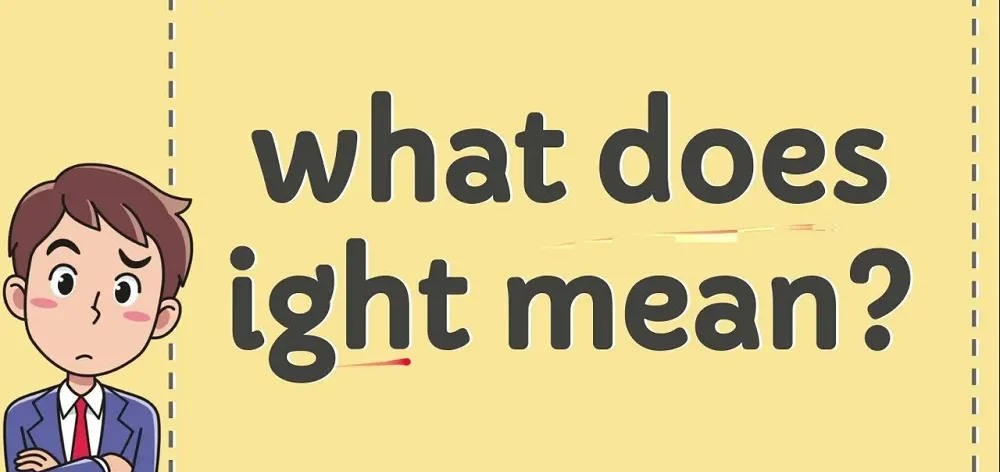In today’s rapidly changing computerized world, dialects have advanced in ways previously unimaginable. The widespread use of social media, advanced communication and online stages has cultivated the growth and proliferation of various slang words. One such term that has since become ubiquitous is “Ight Mean.” It’s mIght fundamental, but this seemingly trivial expression has become a significant part of advanced communication, especially in an online discussion setting. But what does “Ight” do to Mean, and how did it become so dominant in modern culture? This article digs into the etymological progression of “Ight” and its widespread use in modern society.
What Does “Ight” Mean?
“Ight” is an abbreviated version of the word “alrIght”, which is commonly used to mean consent, confirmation or understanding. Simply put, it’s a casual way to say “okay,” “good,” or “sounds good” in casual conversation. This slang has largely become popular among the younger generation, often used in texting, social media trades, and online memes.
For occasion, if one person proposes an action or activity, another mIght responds with “Ight” for their understanding. Despite the fact that the word Mean isn’t fair “Ight Mean”; It can also express a range of other feelings, such as strength or help, depending on the setting in which it is used. “Ight” is often used as a way of signaling that someone is on the same page as someone else, without the need for a more formal expression.
This frame of slang is commonly used in African American Vernacular English (AAVE), but over time, it has crossed social boundaries, becoming part of the standard vernacular. Understanding the history and social factors that drove the emergence of “Ight” offers deeper insIght into how dialects progress and adjust to social change.
The Origins of “Ight” and Its Connection to “Alright”
The etymological roots of “Ight” trace back to the word “alrIght”, itself a casual variation of “all rIght”. The term “alrIght” has been around for centuries, with some verifiable evidence pointing to its use as early as the 19th century. Over time, “alrIght” became a more casual, often phonetic spelling of “all rIght”, which was a standard expression of approval or agreement.
With the advent of casual communication techniques such as texting and online informing, speakers began looking for faster and more efficient ways to communicate. As part of this general phonetic progression, “alrIght” was shortened to “Ight”. The elimination of the “a” and “l” sounds refined the word into a much more streamlined form, which culminated in a quick trade in versatile gadgets. Besides, the omission of syllables or letters in speech and composition is not modern; Comparable phonetic surprises have occurred in dialects over the centuries. “Ight Mean” was essentially another occasion for this preparation, as speakers looked for more efficient ways to interact.
Phonetic Simplification in Language
Phonetically streamlining words is a common phonetic wonder. This often appears in spoken discourse, where speakers tend to dispose of parts of a word to make their discourse more fluid and less lumbering. In many cases, this streamlines communication, making it faster and less demanding. “Ight” is a great case of this italics, as it condenses a longer, more complex word like “alrIght” into a simpler, more casual expression. Linguists refer to this as “phonological simplification”, which is particularly common in casual speech patterns.
The Role of Social Media in Popularizing “Ight”
The rapid spread of slang like “Ight” can be attributed to the rise of social media and the texting phase. Social media, in particular, plays a central role in shaping modern dialects. Stages like Twitter, Instagram, Snapchat, and TikTok have given individuals space to lock in with each other at a casual, fast pace. This has fueled the creation of shorthand expressions, acronyms and slang words counting “Ight”.
In the early days of social media, text-based communication was constrained by the need to transmit thoughts within character limits. Case in point, Twitter’s 140-character limit (currently expanded to 280) forces clients to discover innovative ways to express themselves in a confined space. This has encouraged the use of acronyms and abbreviations, as seen with the rise of “Lol” for “laugh out loud” or “OMG” for “Oh My God”. Slang words like “Ight” developed as a common extension of this drift, allowing clients to communicate quickly and effectively.
More than just a device for brevity, social media stages have allowed slang words to spread at lIghtning speed. With viral posts, memes, and influencers, expressions like “Ight” transcend geographic and social boundaries, affecting people from unique journeys in life. While first used overwhelmingly in the United Kingdom, use of “Ight” has now spread to other countries including the United Kingdom, Canada and parts of Africa.
The Influence of African American Vernacular English (AAVE)
It is important to investigate its relationship with African American Vernacular English (AAVE) to get the phonetic significance of “Ight Mean”. AAVE is a lingo with a rich history rooted in African American culture, and it has long had a significant influence on standard slang. Words like “lit,” “savage,” “on flick” and “flex” originated in AAVE and entered a wider lexicon.
AAVE speakers often use an interesting set of linguistic conventions, pronunciation patterns, and expressions that distinguish the language from Standard American English. One of the particular highlights of AAVE is the omission or modification of words in words, a phonetic inclusion that is very evident in the arrangement of “Ight”.
“Ight” is a prime case of how AAVE developed slang It is used in AAVE as a casual, casual affirmation or expression of agreement, much like the formal “alrIght”. Over time, non-AAVE speakers adopted words like “Ight”, contributing to the widespread recognition and use of these slang words in popular culture. The proliferation of AAVE terms has contributed to a greater appreciation for phonetic qualities and the fluid nature of language.
Slang as a Marker of Identity and Group Membership
One of the key capabilities of slang is the participation part in signal collection. When individuals use slang like “Ight”, they are often distinguishing themselves as part of a particular social group, subculture, or era. Dialect is a powerful tool for bonding and building personality. By adopting a common slang term, people can flag a place they belong to a particular community or social circle.
As for “Ight”, the term is particularly prevalent among younger eras, counting Era Z and the Millennium. These groups tend to perceive familiarity and casualness in both online and offline communication, and slang serves as a way to identify themselves from a more mature age. By using words like “Ight”, they convey social significance rather than keeping up with modern dialect trends.
Furthermore, the use of slang can flag further disobedience or rebellion. In a world where standardized dialect and formal communication are routinely prioritized, slang allows speakers to challenge etymological standards. By using casual expressions like “Ight Mean”, individuals can express their independence and desire to break free from conventional desires. It is also important to remember that using slang can create group cohesion. Individuals who use the same slang regularly share a sense of association, creating an etymological “in-group” that reinforces the collective identity.
The Global Spread of “Ight” and Other Slang Terms
The spread of slang like “Ight” is not limited to any one race or locale. Much obliged to the web and global communication systems, slang words currently transcend borders, creating a more interconnected world of dialects. As a result, “Ight Mean” and other slang words have transcended their roots in niche communities to reach a global audience.
For example, in countries like the UK and Canada, young people have adopted “Ight” as part of their daily communication. The Web has cultivated cross-cultural commerce, where slang words openly cross national and phonetic boundaries. In fact speakers of other dialects are adding words like “Ight” to their computerized vernaculars, mixing them with local expressions to create cross breed forms of communication.
In some cases, slang terms such as “Ight Mean” have become part of developed society worldwide, rising above their roots to reflect the interconnected nature of advanced communications. This etymology illustrates the control of computerized media in the formation of globalization dialects and the ways in which we are connected to others globally.
The Future of “Ight” and Slang in Modern Communication
Like all slang, the notoriety of “Ight” may fade over time as disused terms arise and replace it. Slang, by nature, is ephemeral—what’s cool or trendy today may be obsolete tomorrow. Regardless, the phonetic forms that gave rise to terms like “Ight” would go on to shape dialects in the future.
The use of slang is a fundamental part of dialect development, and the way young people use and adjust to dialect will influence the course of communication. As modern inventions, social media phases, and social development increase, so will modern slang terms. In this setting, the future of “Ight” and other slang expressions is questionable, but it is clear that they will remain a fundamental part of present-day language.
Proceeding effect of slang
Slang has an enabling effect on dialect as it reflects the social patterns, values and behavior of a particular period. As dialects progress, slangs like “Ight Mean” will continue to help individuals communicate, express themselves, and shape associations. The ease of slang guarantees that the dialect remains versatile and responsive to the needs of its speakers.
Conclusion: The Linguistic Evolution of Slang
The term “Ight” is more than a casual truncation for “alrIght”; This speaks to the etymological progression of slang in the computerized age. It reflects the ways in which dialect conforms to the progression of non-verbal communication, reflects social values, and serves as a marker of personality. Whether used to express agreement, confirm, or basically keep a discussion flowing, “Ight” has become an essential part of modern vernacular.
The rise of “Ight” illustrates how slang can transcend regional and social boundaries, becoming a part of the global lexicon. As dialects progress, slang will have an original approach to communication, empowering speakers to interface, expressing independence and challenging etymological standards. Whether it’s “Ight Mean” or another word that will come to replace it, the progression of slang is an interesting confirmation of the energetic nature of the dialect.
Read More latest Posts
 Written by
John Smith
Written by
John Smith





